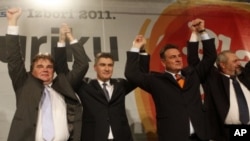Voters have ousted governments in two former Yugoslav republics. In Croatia, a center-left opposition coalition defeated the incumbent conservatives, while in neighboring Slovenia a new center-left party won Sunday's parliament elections.
Voters in Croatia and Slovenia have punished their governments for alleged corruption and poor economic performance.
Official results show that Croatia's center left coalition "Kukuriku" - named after the rooster cry - will take more than half the 151-seats in parliament.
The ruling conservative Croatian Democratic Union, or HDZ, lost amid public anger about corruption scandals, declining living standards and high unemployment.
But analysts caution that the new government must introduce austerity measures to overcome an economic crisis ahead of Croatia's expected European Union membership in 2013.
Outgoing Prime Minister Jadranka Kosor warns her HDZ party will be a tough political rival.
She says the most important thing about the elections was that HDZ "did not disappear from the political scene." She vows to play a prominent role in the opposition.
Croatia is not the only former Yugoslav republic where the government was ousted Sunday.
In neighboring Slovenia, a new center-left party, led by a prominent businessman and mayor of the capital, Ljubljana, was the surprise election winner, although the conservatives had been the favorites.
Zoran Jankovic's Positive Slovenia party received nearly 29 percent of the vote.
He told supporters the result shows Slovenia is headed in the right direction. He says voters wanted an efficient government, the rule of law, democracy and social stability.
His Positive Slovenia party will have to tackle the country's mounting debt, unemployment and a looming recession.
Jankovic has promised swift reforms, including austerity measures in this Alpine nation of two-million people.
Slovenia was the first former Yugoslav republic to enter the European Union, joining the bloc in 2004.
Three years later, it also became the first of a dozen new EU members to adopt the euro as its official currency.




